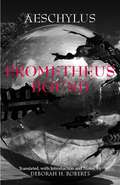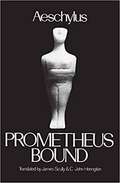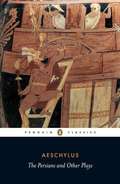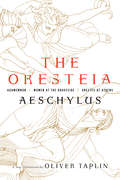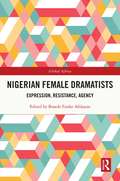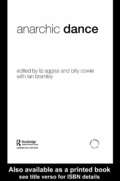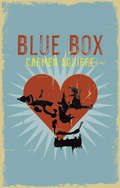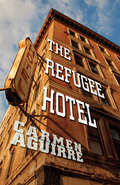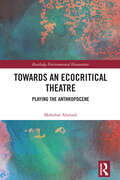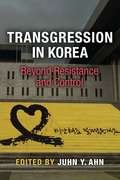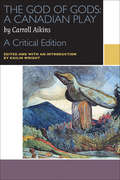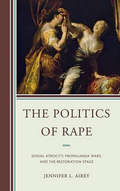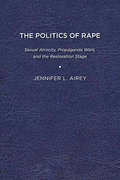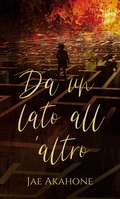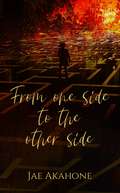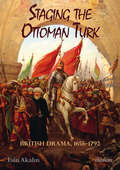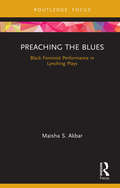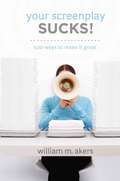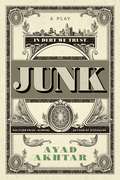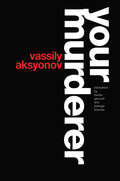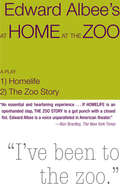- Table View
- List View
Prometheus Bound
by Aeschylus Deborah RobertsThis is an outstandingly useful edition of Prometheus Bound. The translation is both faithful and graceful, and the introduction to this difficult play is a model of clarity, intelligence, and a profound familiarity with the workings of Greek myth, Greek literature, and literature in general. --Rachel Hadas, Department of English, Rutgers University
Prometheus Bound (Greek Tragedy In New Translations)
by Aeschylus James Scully C. John HeringtonFor readers accustomed to the relatively undramatic standard translations ofPrometheus Bound, this version by James Scully, a poet and winner of the Lamont Poetry Prize, and C. John Herington, one of the world's foremost Aeschylean scholars, will come as a revelation. Scully and Herington accentuate the play's true power, drama, and relevance to modern times. Aeschylus originally wrotePrometheus Boundas part of a tragic trilogy, and this translation is unique in including the extant fragments of the companion plays.
The Persians And Other Plays
by Aeschylus Alan H. SommersteinAeschylus (525-456 BC) brought a new grandeur and epic sweep to the drama of classical Athens, raising it to the status of high art. The Persians, the only Greek tragedy to deal with events from recent Athenian history, depicts the final defeat of Persia in the battle of Salamis, through the eyes of the Persian court of King Xerxes, becoming a tragic lesson in tyranny. In Prometheus Bound, the defiant Titan Prometheus is brutally punished by Zeus for daring to improve the state of wretchedness and servitude in which mankind is kept. Seven Against Thebes shows the inexorable downfall of the last members of the cursed family of Oedipus, while The Suppliants relates the pursuit of the fifty daughters of Danaus by the fifty sons of Aegyptus, and their final rescue by a heroic king.
The Oresteia: Agamemnon, Women At The Graveside, Orestes In Athens
by Aeschylus Oliver TaplinThis spellbinding, groundbreaking translation reenergizes Aeschylus’ enduring saga of split loyalties, bloody sacrifice, and the efforts to bring peace after generations of strife. The most renowned of Aeschylus’ tragedies and one of the foundational texts of Western literature, the Oresteia trilogy is about cycles of deception and brutality within the ruling family of Argos. In Agamemnon, afflicted queen Clytemnestra awaits her husband’s return from war to commit a terrible act of retribution for the murder of her daughter. The next two plays, radically retitled here as The Women at the Graveside and Orestes in Athens, deal with the aftermath of the regicide, Orestes’ search to avenge his father’s death, and the ceaseless torment of the young prince. A powerful discourse on the formation of democracy after a period of violent chaos, The Oresteia has long illuminated the tensions between loyalty to one’s family and to the greater community. Now, Oliver Taplin’s “vivid and accessible translation” (Victoria Mohl) captures the lyricism of the original, in what is sure to be a classic for generations to come.
Nigerian Female Dramatists: Expression, Resistance, Agency (Global Africa)
by Bosede Funke AfolayanThis book showcases the important, but often understudied, work of Nigerian women playwrights. As in many spheres of life in Nigeria, in literature and other creative arts the voices of men dominate, and the work of women has often been sidelined. However, Nigerian women playwrights have made important contributions to the development of drama in Nigeria, not just by presenting female identities and inequalities but by vigorously intervening in wider social and political issues. This book draws on perspectives from culture, language, politics, theory, orality and literature, to shine a light on the engaged creativity of women playwrights. From the trail blazing but more traditional contributions of Zulu Sofola, through to contemporary postcolonial work by Tess Osonye Onwueme, Julie Okoh, and Sefi Atta, to name just a few, the book shows the rich variety of work being produced by female Nigerian dramatists. This, the first major collection devoted to Nigerian women playwrights, will be an important resource for scholars of African theatre and performance, literature and women’s studies.
Anarchic Dance
by Liz Aggiss Billy Cowie Ian BramleyLiz Aggiss and Billy Cowie, known collectively as Divas Dance Theatre, are renowned for their highly visual, interdisciplinary brand of dance performance that incorporates elements of theatre, film, opera, poetry and vaudevillian humour. Anarchic Dance, consisting of a book and DVD-Rom, is a visual and textual record of their boundary-shattering performance work. The DVD-Rom features extracts from Aggiss and Cowie's work, including the highly-acclaimed dance film Motion Control (premiered on BBC2 in 2002), rare video footage of their punk-comic live performances as The Wild Wigglers and reconstructions of Aggiss's solo performance in Grotesque Dancer. These films are cross-referenced in the book, allowing readers to match performance and commentary as Aggiss and Cowie invite a broad range of writers to examine their live performance and dance screen practice through analysis, theory, discussion and personal response. Extensively illustrated with black and white and colour photographs Anarchic Dance, provides a comprehensive investigation into Cowie and Aggiss’s collaborative partnership and demonstrates a range of exciting approaches through which dance performance can be engaged critically.
Blue Box
by Carmen AguirreInterweaving recollections of her revolutionary life in Chile under Augusto Pinochet's regime with her fleeting attempts to realize a "vision" of love in Los Angeles, Carmen Aguirre's one-woman show Blue Box is a fiery proclamation of carnal yearning and social conviction. As ever, Aguirre is assertive, sexy, and wryly political, sharing the sacrifices of her life with humor and courage.Carmen Aguirre is a Vancouver-based theater artist and screen actor who has worked extensively throughout North and South America. She organizes Theatre of the Oppressed workshops and teaches in the acting department at the Vancouver Film School. Her 2011 autobiography, Something Fierce: Memoirs of a Revolutionary Daughter, is an award-winning bestseller.
The Refugee Hotel
by Carmen AguirreSet in a run-down Vancouver hotel in 1974, only months after the start of the infamous Pinochet regime, eight Chilean refugees struggle, at times haplessly, at times profoundly, to decide if fleeing their homeland means they have abandoned their friends and responsibilities or not. More than a dark comedy, this play gives voice to refugee communities from all corners.
Towards an Ecocritical Theatre: Playing the Anthropocene (Routledge Environmental Humanities)
by Mohebat AhmadiTowards an Ecocritical Theatre investigates contemporary theatre through the lens of Anthropocene-oriented ecocriticism. It assesses how Anthropocene thinking engages different modes of theatrical representation, as well as how the theatrical apparatus can rise to the representational challenges of changing interactions between humans and the nonhuman world. To explore these problems, the book investigates international Anglophone plays and performances by Caryl Churchill, Stephen Sewell, Andrew Bovell, E.M. Lewis, Chantal Bilodeau, Jordan Hall, and Miwa Matreyek, who have taken significant steps towards re-orienting theatre from its traditional focus on humans to an ecocritical attention to nonhumans and the environment in the Anthropocene. Their theatrical works show how an engagement with the problem of scale disrupts the humanist bias of theatre, provoking new modes of theatrical inquiry that envision a scale beyond the human and realign our ecological culture, art, and intimacy with geological time. Moreover, the plays and performances studied here, through their liveness, immediacy, physicality, and communality, examine such scalar shifts via the problem of agency in order to give expression to the stories of nonhuman actants. These theatrical works provoke reflections on the flourishing of multispecies responsibilities and sensitivities in aesthetic and ethical terms, providing a platform for research in the environmental humanities through imaginative conversations on the world’s iterative performativity in which all bodies, human and nonhuman, are cast horizontally as agential forces on the theatrical world stage. This book will be of great interest to students and scholars of theatre studies, environmental humanities, and ecocritical studies.
Transgression in Korea: Beyond Resistance and Control (Perspectives On Contemporary Korea)
by Juhn Young AhnSince the turn of the millennium South Korea has continued to grapple with transgressions that shook the nation to its core. Following the serial killings of Korea’s raincoat killer, the events that led to the dissolution of the United Progressive Party, the criminal negligence of the owner and also the crew members of the sunken Sewol Ferry, as well as the political scandals of 2016, there has been much public debate about morality, transparency, and the law in South Korea. Yet, despite its prevalence in public discourse, transgression in Korea has not received proper scholarly attention. Transgression in Korea challenges the popular conceptions of transgression as resistance to authority, the collapse of morality, and an attempt at self- empowerment. Examples of transgression from premodern, modern, and contemporary Korea are examined side by side to underscore the possibility of reading transgression in more ways than one. These examples are taken from a devotional screen from medieval Korea, trickster tales from the late Choson period, reports about flesheating humans, newspaper articles about same- sex relationships from colonial Korea, and films about extramarital affairs, wayward youths, and a vengeful vigilante. Bringing together specialists from various disciplines such as history, art history, anthropology, premodern literature, religion, and fi lm studies, the context- sensitive readings of transgression provided in this book suggest that transgression and authority can be seen as forming something other than an antagonistic relationship.
The God of Gods: A Critical Edition (Canadian Literature Collection)
by Carroll AikinsCarroll Aikins’s play The God of Gods (1919) has been out of print since its first and only edition in 1927. This critical edition not only revives the work for readers and scholars alike, it also provides historical context for Aikins’s often overlooked contributions to theatre in the 1920s and presents research on the different staging techniques in the play’s productions. Much of the play’s historical significance lies in Aikins’s vital role in Canadian theatre, as director of the Home Theatre in British Columbia (1920–22) and artistic director of Toronto’s Hart House Theatre (1927–29). Wright reveals The God of Gods as a modernist Canadian work with overt influences from European and American modernisms. Aikins’s work has been compared to European modernists Gordon Craig, Adolphe Appia, and Jacques Copeau. Importantly, he was also intimately connected with modernist Canadian artists and the Group of Seven (who painted the scenery for Hart House Theatre). The God of Gods contributes to current studies of theatrical modernism by exposing the primitivist aesthetics and theosophical beliefs promoted by some of Canada’s art circles at the turn of the twentieth century. Whereas Aikins is clearly progressive in his political critique of materialism and organized religion, he presents a conservative dramatization of the noble savage as hero. The critical introduction examines how The God of Gods engages with Nietzschean and theosophical philosophies in order to dramatize an Aboriginal lover-artist figure that critiques religious idols, materialism, and violence. Ultimately, The God of Gods offers a look into how English and Canadian theatre audiences responded to primitivism, theatrical modernism, and theosophical tenets during the 1920s.
The Politics of Rape: Sexual Atrocity, Propaganda Wars, and the Restoration Stage
by Jennifer L. AireyThe Politics of Rape: Sexual Atrocity, Propaganda Wars, and the Restoration Stage is the first full-length study to examine representations of sexual violence on the Restoration stage. By reading theatrical depictions of sexual violence alongside political tracts, propaganda pamphlets, and circulating broadsides, this study argues that authors used dramatic representations of rape to respond to and engage with late-century upheavals in British political culture. Beginning with an examination of rape scenes in English Civil War propaganda, The Politics of Rape argues that Roundhead authors described acts of rape and atrocity to demonize their enemies, the Irish, the Catholics, and the Cavaliers. After the Restoration, propagandists and playwrights on each side of every political conflict would follow suit, altering the rhetoric of sexual violence in response to each new moment of political upheaval: The Restoration of Charles II, the Second and Third Anglo-Dutch Wars, the Popish Plot, the Exclusion Crisis, the Glorious Revolution, and the accession of William and Mary. The study offers an intensive look at British propaganda culture, gathering together a wealth of understudied pamphlet texts, and identifying a series of stock figures that recur throughout the century: The demonic Irishman, sexually violent villain of the 1641 Irish Rebellion tracts; the debauched Cavalier, the secretly Catholic royalist rapist; the poisonous Catholic bride, the malignant consort who encourages the rapes of Protestant women; the cannibal father, the evil patriarch who rapes his daughters-in-laws before ingesting his own sons as a symbol of monarchical overreach; and the ravished monarch, the male rape victim whose sexual violation protests his political disenfranchisement. The study also traces the appearance of these figures on the British stage, examining well-known works by Dryden, Rochester, Behn, Lee, and Shadwell, alongside lesser-known plays by Orrery, Howard, Settle, Crowne, Ravenscroft, Pix, Cibber, and Brady. The Politics of Rape thus offers a new method for understanding of the geo-political implications of theatrical sexual violence. Published by University of Delaware Press. Distributed worldwide by Rutgers University Press.
The Politics of Rape: Sexual Atrocity, Propaganda Wars, and the Restoration Stage
by Jennifer L. AireyThe Politics of Rape: Sexual Atrocity, Propaganda Wars, and the Restoration Stage is the first full-length study to examine representations of sexual violence on the Restoration stage. By reading theatrical depictions of sexual violence alongside political tracts, propaganda pamphlets, and circulating broadsides, this study argues that authors used dramatic representations of rape to respond to and engage with late-century upheavals in British political culture. Beginning with an examination of rape scenes in English Civil War propaganda, The Politics of Rape argues that Roundhead authors described acts of rape and atrocity to demonize their enemies, the Irish, the Catholics, and the Cavaliers. After the Restoration, propagandists and playwrights on each side of every political conflict would follow suit, altering the rhetoric of sexual violence in response to each new moment of political upheaval: The Restoration of Charles II, the Second and Third Anglo-Dutch Wars, the Popish Plot, the Exclusion Crisis, the Glorious Revolution, and the accession of William and Mary. The study offers an intensive look at British propaganda culture, gathering together a wealth of understudied pamphlet texts, and identifying a series of stock figures that recur throughout the century: The demonic Irishman, sexually violent villain of the 1641 Irish Rebellion tracts; the debauched Cavalier, the secretly Catholic royalist rapist; the poisonous Catholic bride, the malignant consort who encourages the rapes of Protestant women; the cannibal father, the evil patriarch who rapes his daughters-in-laws before ingesting his own sons as a symbol of monarchical overreach; and the ravished monarch, the male rape victim whose sexual violation protests his political disenfranchisement. The study also traces the appearance of these figures on the British stage, examining well-known works by Dryden, Rochester, Behn, Lee, and Shadwell, alongside lesser-known plays by Orrery, Howard, Settle, Crowne, Ravenscroft, Pix, Cibber, and Brady. The Politics of Rape thus offers a new method for understanding of the geo-political implications of theatrical sexual violence. Published by University of Delaware Press. Distributed worldwide by Rutgers University Press.
Da un lato all'altro
by Jae AkahoneRaccolta di due racconti. Declino: La sento nelle vene. La sento nella testa. Non mi abbandona mai. È probabilmente la più intensa sensazione al mondo. Anche la più strana. Allo stesso tempo, mi dà tanto benessere e tanto dolore. Mi pervade tutto il corpo. Mi fa girare la testa. Ne sono attratto in modo inesorabile. Anche se fa di tutto per uccidermi ogni giorno di più. Borderline: sono ubriaco di questa sensazione che percepisco quando, mi avvicino al punto di non ritorno. Ma ne sono ubriaco per una sola buona ragione. Semplicemente perché il tuo sguardo e la tua attenzione mi faranno rivivere come ogni volta, permettendomi di ricominciare daccapo. Sono ubriaco di te.
From one side to the other side
by Jae AkahoneIt's a series of two short stories. The first story is about someone who wants to wean from drugs and the second story takes place in a psychiatric hospital.
Staging the Ottoman Turk: British Drama, 1656–1792
by Esin AkalınIn the wake of the fear that gripped Europe after the fall of Constantinople in 1453, English dramatists, like their continental counterparts, began representing the Ottoman Turks in plays inspired by historical events. The Ottoman milieu as a dramatic setting provided English audiences with a common experience of fascination and fear of the Other. The stereotyping of the Turks in these plays—revolving around complex themes such as tyranny, captivity, war, and conquests—arose from their perception of Islam. The Ottomans' failure in the second siege of Vienna in 1683 led to the reversal of trends in the representation of the Turks on stage. As the ascending strength of a web of European alliances began to check Ottoman expansion, what then began to dazzle the aesthetic imagination of eighteenth century England was the sultan's seraglio with images of extravaganza and decadence. In this book, Esin Akalin draws upon a selective range of seventeenth and eighteenth century plays to reach an understanding, both from a non-European perspective and Western standpoint, how one culture represents the other through discourse, historiography, and drama. The book explores a cluster of issues revolving around identity and difference in terms of history, ideology, and the politics of representation. In contextualizing political, cultural, and intellectual roots in the ideology of representing the Ottoman/Muslim as the West's Other, the author tackles with the questions of how history serves literature and to what extent literature creates history.
Preaching the Blues: Black Feminist Performance in Lynching Plays (Routledge Advances in Theatre & Performance Studies)
by Maisha S. AkbarPreaching the Blues: Black Feminist Performance in Lynching Plays examines several lynching plays to foreground black women’s performances as non-normative subjects who challenge white supremacist ideology. Maisha S. Akbar re-maps the study of lynching drama by examining plays that are contingent upon race-based settings in black households versus white households. She also discusses performances of lynching plays at Historically Black Colleges and Universities (HBCUs) in the South and reviews lynching plays closely tied to black school campuses. By focusing on current examples and impacts of lynching plays in the public sphere, this book grounds this historical form of theatre in the present day with depth and relevance. Of interest to scholars and students of both general Theatre and Performance Studies, and of African American Theatre and Drama, Preaching the Blues foregrounds the importance of black feminist artists in lynching culture and interdisciplinary scholarship.
Your Screenplay Sucks!: 100 Ways To Make It Great
by William M. AkersA lifetime member of the Writer's Guild of America who has had three feature films produced from his screenplays, Akers offers beginning writers the tools they need to get their screenplay noticed.
Junk: A Play
by Ayad Akhtar*Now on Broadway at Lincoln Center starring Steven Pasquale* From the Pulitzer Prize-winning author of Disgraced, a fast-paced economic thriller that exposes the financial deal making behind the mergers and acquisitions boom of the 1980s.Set in 1985, Junk tells the story of Robert Merkin, resident genius of the upstart investment firm Sacker Lowell. Hailed as "America's Alchemist," his proclamation that "debt is an asset" has propelled him to a dizzying level of success. By orchestrating the takeover of a massive steel manufacturer, Merkin intends to do the "deal of the decade," the one that will rewrite all the rules. Working on his broadest canvas to date, Pulitzer Prize winner Ayad Akhtar chronicles the lives of men and women engaged in financial civil war: insatiable investors, threatened workers, killer lawyers, skeptical journalists, and ambitious federal prosecutors. Although it's set 40 years in the past, this is a play about the world we live in right now; a world in which money became the only thing of real value.
Slaves and Slavery in Ancient Greek Comic Drama
by Ben Akrigg Rob TordoffHow did audiences of ancient Greek comedy react to the spectacle of masters and slaves? If they were expected to laugh at a slave threatened with a beating by his master at one moment but laugh with him when they bantered familiarly at the next, what does this tell us about ancient Greek slavery? This volume presents ten essays by leading specialists in ancient Greek literature, culture and history, exploring the changing roles and representations of slaves in comic drama from Aristophanes at the height of the Athenian Empire to the New Comedy of Menander and the Hellenistic World. The contributors focus variously on individual comic dramas or on particular historical periods, analysing a wide range of textual, material-culture and comparative data for the practices of slavery and their representation on the ancient Greek comic stage.
Your Murderer (Russian Theatre Archive Ser. #Vol. 18.)
by Vassily AksyonovFrom Russia comes this ironic, satirical, multi-layered, modern pop-art parable by Vassily Aksyonov. Your Murderer is a richly grotesque hodgepodge of different linguistic levels that defies all rules and mixes a powerful cocktail out of traditional slogans, invented obscentities, foreign words and phrases, terminology from sports and heavy drinking, and pure nonsense. Daniel Gerould is Lucille Lortel Distinguished Professor of Theater and Comparative Literature at the City University of New York. He is the Editor of Slavic and East European Performance and of harwood academic publishers's Polish and East European Theater Archive series. Your Murderer comes from Russia and is an ironic, satirical, multi-layered, modern pop-art parable - richly grotesque and on different linguistic levels. that defies all rules, mixing a powerful cocktail out of traditional slogans, invented obscentities, foreign words and phrases, terminology from sports and heavy drinking, and pure nonsense.
Extramural Shakespeare
by Denise AlbaneseThis study argues that Shakespeare can now be understood as part of public culture. Thanks to the emergence of mass education in the twentieth century, Albanese argues that Shakespeare has become a shared property, despite the depiction of his texts as 'elite' cultural objects in the film industry.
At Home at the Zoo: Homelife and the Zoo Story
by Edward Albee“I’ve been to the zoo.” These opening words usher the audience into one of the most iconic plays in American theater history: The Zoo Story. More than fifty years later, master playwright Edward Albee (Who’s Afraid of Virginia Woolf? and The Goat, or Who is Sylvia?) wrote a prequel to this classic. Home Story contains the events in Peter’s life immediately preceding his encounter with Jerry on the park bench and is every bit as powerful as the original. We meet Ann, Peter’s wife, and see the conversation that compelled Peter to go for that fateful walk in the park. For the first time collected in one volume, At Home at the Zoo is a must for any theater lover.
At Home at the Zoo: Homelife and the Zoo Story
by Edward Albee"I've been to the zoo." These opening words usher the audience into one of the most iconic plays in American theater history: The Zoo Story. More than fifty years later, master playwright Edward Albee (Who's Afraid of Virginia Woolf? and The Goat, or Who is Sylvia?) wrote a prequel to this classic. Home Story contains the events in Peter's life immediately preceding his encounter with Jerry on the park bench and is every bit as powerful as the original. We meet Ann, Peter's wife, and see the conversation that compelled Peter to go for that fateful walk in the park. For the first time collected in one volume, At Home at the Zoo is a must for any theater lover.
At Home at the Zoo
by Edward AlbeeThese opening words usher the audience into one of the most iconic plays in American theatre history: The Zoo Story. More than fifty years later, master playwright Edward Albee (Who's Afraid of Virginia Woolf? and The Goat, or Who is Sylvia?) wrote a prequel to his classic. Home Life contains the events in Peter's life immediately preceding his encounter with Jerry on the park bench and is every bit as powerful as the original. We meet Ann, Peter's wife, and see the conversation that compelled Peter to go for that fateful walk in the park. For the first time collected in one volume, Edward Albee's At Home at the Zoo is a must for any theatre lover.
